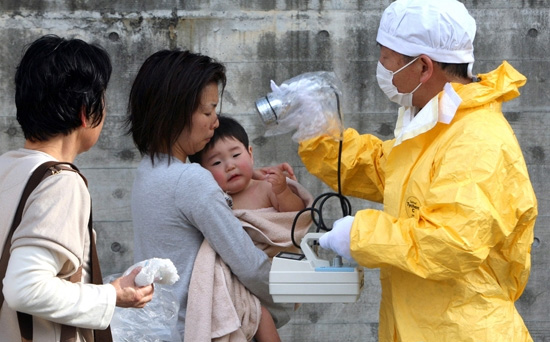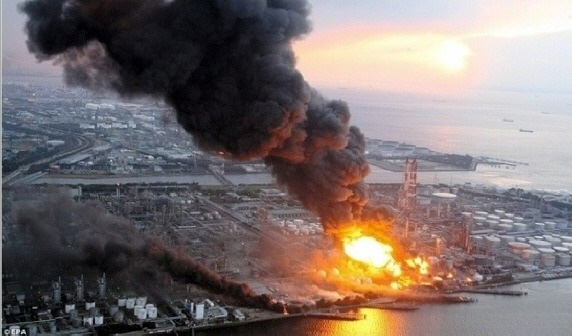 영어토론방 영어토론방 | Home>영어토론방 |
Geography What should we do for free from fear of radiation?
페이지 정보

본문

Japan’s nuclear reactors getting out of control
Despite desperate efforts, the Japanese government, military and power authorities appeared to be losing control over the stricken Fukushima nuclear power plant, as emergency workers were ordered to withdraw from the site due to spiking radiation levels.
Of the six reactors at the plant, explosions and fires were reported at reactor No. 4 and radioactive steam was detected from reactor No. 3. No detailed information was available about the incidents as authorities were unable to approach the site. Four reactors are in trouble, and the remaining two reactors also appear to have rising temperatures in pools storing spent nuclear fuel.
The Japanese Nuclear Energy Safety Organization (JNES) had initially announced it as a level four on the same scale. “This accident cannot be seen as a level four,” the statement said, referring to explosions in reactors No.1 through No.3 and the fire at reactor No.4. It emphasized that support of the international community was needed for emergency measures.
Officials said radiation levels in areas 20 kilometers away from the plant were about 6,600 times normal levels by late morning. That figure is 20 times the total amount of radiation exposure allowed in an entire year for a plant worker in Japan.
(Korea JungAng Daily, by Park Bang-Ju / Kim Dong-ho & Jung Jae-Hong)

U.S. Sounds Alarm on Radiation in Japan
Earlier in the last Wednesday, the top U.S. nuclear regulator, Gregory Jaczko, called radiation levels at one of the plant's units "extremely high," adding that, "for a comparable situation in the United States we would recommend an evacuation for a much larger radius than is currently being provided in Japan."
Also on same day, the U.K. government advised its citizens in the city of Tokyo, a full 150 miles from the nuclear site, to "consider leaving the area" due to increasing infrastructure problems. The European Union's energy chief also declared the Fukushima Daiichi site "effectively out of control."
(WSJ ASIA, by Norihiko Shirouzu and Rebecca Smith)
Radiation Fear Also Rises in Korea
Fear that radiation leakage will spread across the region is rising in South Korea as well as China and elsewhere. Here, authorities have tried to keep the worries from getting out of hand.
The Korean Pharmaceutical Association issued a statement late Wednesday after pharmacists reported surge in inquiries about iodine tablets, which can be taken to limit the damage that radiation can cause on the thyroid.
The association said such worries were unwarranted at the moment. It noted that high levels of iodine are needed and that there are complications, such as allergic reactions in some people. “Further, it is said that there is no chance of radioactive material reaching Korean soil, so taking high amounts of iodine may end up being harmful,” the association said.
“There is no need to purchase iodine (pills) based on vague fears about radiation from Fukushima; if (citizens are) concerned about exposure to radiation, it would be better to increase the intake of foods with a lot of iodine such as kelp, seaweed and dried laver rather than taking iodine pills,” the pharmaceutical association said.
(WSJ KOREA REALTIME, by Lee Se-young)
Lee orders all nuclear reactors to be inspected
With the possibility of a meltdown at the Fukushima nuclear plant in Japan, the Korean government is now looking at its own nuclear plants, questioning their safety. President Lee Myung-bak ordered an examination of all nuclear plants in the nation, sending Minister of Education, Science and Technology Lee Ju-ho to the Kori Nuclear Power Plant in Gori, a village in Busan in southern Korea.
Minister Lee was sent to Busan to check the preparedness of the Kori Nuclear Power Plant what nation’s 1st nuclear reactor against natural disasters like earthquakes and tsunamis.
GNP Representative Ryu Jung-hyun warned of the risk the Korean Peninsula faces in being exposed to Japan’s nuclear reactors exploding on one side and to China, also at risk for earthquakes, building nuclear reactors on the other. “We need to come up with a contingency plan, as we can directly be affected in the case of radiation exposure,” said Ryu. In addition, since the problems at Fukushima, civic groups have been protesting in front of nuclear plants in Korea out of safety concerns.
(Korea JungAng Daily, by Yonhap News Agency)
*reactor: 원자로, iodine: 요오드, thyroid: 갑상선
Question
1. What do you think about this huge disaster that happened in Japan?
Do you want to help them? If you want to help, what are the things that you can do?
2. Yesterday, 3 people (1 Korean, 2 Japanese) who are exposed to radiation are founded in
Incheon International Airport's radiation exposure check-out stand. What should Korean government do first?
3. Nuclear power is the best way of getting much energy in cheaper price,
but those plants might bring terrible disasters again. Do we have to keep it in spite of danger?
이 글은「대학연합영어토론동아리」www.pioneerclub.com에서 제공하는 영어토론 정보입니다.
댓글목록
등록된 댓글이 없습니다.

